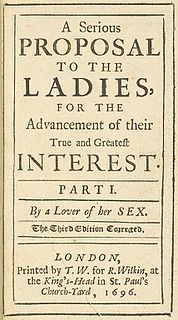A Quote by Mary Astell
Why is Slavery so much condemn'd and strove against in one Case, and so highly applauded and held so necessary and so sacred in another?
Related Quotes
It is Toussaint's supreme merit that while he saw European civilisation as a valuable and necessary thing, and strove to lay its foundations among his people, he never had the illusion that it conferred any moral superiority. He knew French, British, and Spanish imperialists for the insatiable gangsters that they were, that there is no oath too sacred for them to break, no crime, deception, treachery, cruelty, destruction of human life and property which they would not commit against those who could not defend themselves.
If, in the case of the worst sinners and those who formerly sinned much against God, when afterwards they believe, the remission of their sins is granted and no one is held back from baptism and grace, how much more, then, should an infant not be held back, who, having but recently been born, has done no sin, except that, born of the flesh according to Adam, he has contracted the contagion of that old death from his first being born. For this very reason does he [an infant] approach more easily to receive the remission of sins: because the sins forgiven him are not his own but those of another
Slavery results from laws, laws are made by governments, and, therefore people can only be freed from slavery by the abolition of governments.... And it is time for people to understand that governments not only are not necessary, but are harmful and most highly immoral institutions, in which a self-respecting, honest man cannot and must not take part.
As for slavery, there is no need for me to speak of its bad aspects. The only thing requiring explanation is the good side of slavery. I do not mean indirect slavery, the slavery of proletariat; I mean direct slavery, the slavery of the Blacks in Surinam, in Brazil, in the southern regions of North America. Direct slavery is as much the pivot upon which our present-day industrialism turns as are machinery, credit, etc. … Slavery is therefore an economic category of paramount importance.
Since the beginning, the US presidents (all of European stock, of course), had been promoting slavery, extermination campaigns against the native population of North America, barbaric wars of aggression against Mexico, and other Latin American countries, the Philippines, etc. Has anything changed now? I highly doubt it.
All that rejection from Republicans has a bit of a racist element. It was very necessary to have a black president, and it's been a great thing. It will help, in the end, to ease the trauma of slavery and civil war. The war against slavery cost almost 800,000 American lives - that's how strongly they felt about it. And it's not going to go away in a century.
I have observed this in my experience of slavery, - that whenever my condition was improved, instead of its increasing my contentment, it only increased my desire to be free, and set me to thinking of plans to gain my freedom. I have found that, to make a contented slave, it is necessary to make a thoughtless one. It is necessary to darken his moral and mental vision, and, as far as possible, to annihilate the power of reason. He must be able to detect no inconsistencies in slavery; he must be made to feel that slavery is right; and he can be brought to that only when he ceased to be a man.
Pathology is a relatively easy thing to discuss, health is very difficult. This, of course, is one of the reasons why there is such a thing as the sacred, and why the sacred is difficult to talk about, because the sacred is peculiarly related to the healthy. One does not like to disturb the sacred, for in general, to talk about something changes it, and perhaps will turn it into a pathology.
Sixty million people died in the Second World War. World War II was a gigantic crime. We condemn it all. We are against bloodshed, regardless of whether a crime was committed against a Muslim or against a Christian or a Jew. But the question is: Why among these 60 million victims are only the Jews the center of attention?




































